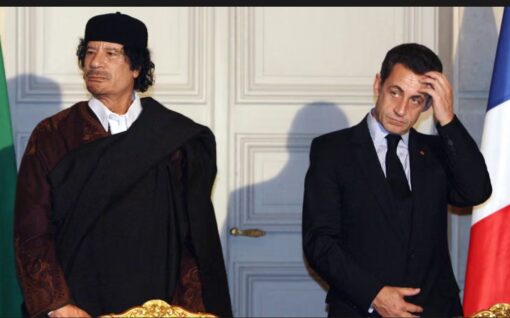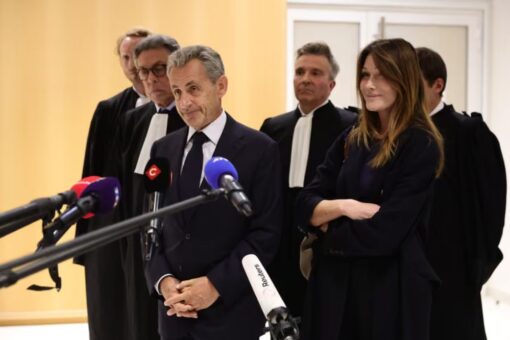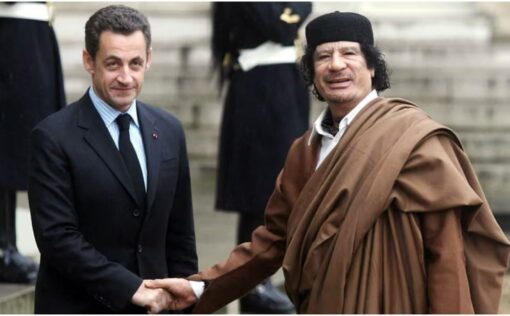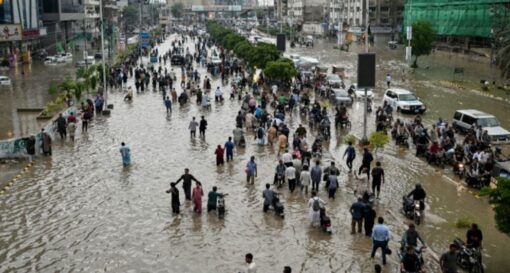Former French President Nicolas Sarkozy has been handed a historic five-year prison sentence following his conviction for criminal conspiracy in connection with a secret pact with the late Libyan leader Muammar Gaddafi.
This unprecedented ruling marks the first time a modern French head of state has been sentenced to prison for crimes committed during their presidency.
The Paris court, presided over by Judge Nathalie Gavarino, described Sarkozy’s offenses as of “exceptional gravity” and warned that they could undermine public trust in the French justice system.
Sarkozy, 70, will serve his sentence even if he appeals, a rare legal provision reflecting the severity of the case. Additionally, he has been ordered to pay a €100,000 fine.

Sarkozy has consistently denied wrongdoing, calling the verdict a scandal and asserting his innocence. “I am innocent; this justice is a scandal,” he told reporters as he left the courtroom.
Displaying characteristic defiance, he added: “If they absolutely want me to sleep in jail, I will sleep in jail, but with my head held high.” His comments signal a determination to maintain dignity despite the conviction.
The trial focused on allegations that Sarkozy and his aides entered a secret “corruption pact” with the Gaddafi regime to secure illegal funding for his successful 2007 presidential campaign.
Prosecutors argued that, in return for financial support, the Libyan leader expected political favors, legal assistance, and diplomatic benefits. The case exposed the controversial ties between Sarkozy’s administration and Gaddafi’s authoritarian government, whose decades-long rule was marred by human rights abuses and international isolation.
Evidence presented in court included testimony that members of Sarkozy’s entourage met with Libyan officials in 2005 while Sarkozy was interior minister.
Following his election in 2007, Sarkozy hosted Gaddafi for a state visit in Paris, during which the Libyan leader famously set up a Bedouin tent in the Élysée Palace gardens. The court noted that these interactions were part of a broader pattern linking campaign financing with political concessions.
Sarkozy’s legal troubles have a long history. He has previously been convicted in two separate corruption cases. In the first, he received a one-year jail term for attempting to influence a judge, which he served with an electronic tag for three months.
In the second, he was found guilty of hiding illegal campaign overspending during the 2012 presidential election, which he lost to Socialist François Hollande. Despite these prior convictions, Sarkozy remains an influential figure in French politics, maintaining relationships with key figures on the right and center of the political spectrum.

The court’s Libya ruling also implicated several of Sarkozy’s close allies. Claude Guéant, former campaign director and interior minister, was convicted of criminal conspiracy and corruption.
Brice Hortefeux, another former minister, was found guilty of criminal conspiracy but acquitted of illegal campaign funding. Both are expected to appeal. Éric Woerth, who managed Sarkozy’s campaign finances in 2007 and later joined Emmanuel Macron’s centrist party, was acquitted.
The trial brought renewed attention to Ziad Takieddine, a Franco-Lebanese businessman who claimed to have delivered suitcases of cash from Gaddafi to Sarkozy’s campaign.
Takieddine died suddenly of a heart attack in Beirut two days before the verdict. His previous retraction of incriminating statements sparked accusations of attempted interference, prompting a separate investigation into potential witness pressure.
Sarkozy, his wife Carla Bruni-Sarkozy, and several associates are under formal investigation in connection with this matter, all denying wrongdoing.
The international and domestic implications of the conviction are significant. The case has cast a spotlight on the ethical responsibilities of political leaders and the potential consequences of foreign entanglements.
Analysts note that Sarkozy’s high-profile convictions serve as a cautionary tale for politicians worldwide regarding transparency and campaign finance integrity.
Sarkozy’s wife, Carla Bruni-Sarkozy, visibly supported him outside the courthouse, posting on social media: “Love is the answer” with the hashtag #Hatewillnotwin. Her gesture highlighted the personal dimension of the legal battle, contrasting public criticism with private loyalty.
Reaction across the French political spectrum was mixed. Outgoing right-wing Interior Minister Bruno Retailleau expressed unwavering support, praising Sarkozy for his “energy and determination” and reaffirming his friendship during a challenging period.
Conversely, left-wing MP Clémentine Autain remarked: “Head held high, dirty hands. The rule of law did not fail,” reflecting a starkly contrasting perspective on justice and accountability.
Sarkozy’s convictions come against a backdrop of historical controversy surrounding his foreign policy. In 2011, he spearheaded NATO-led airstrikes against Gaddafi’s forces, which contributed to the eventual overthrow of the Libyan regime.
While praised by some for intervening to protect civilians, critics argue that Sarkozy’s earlier secret dealings with Gaddafi cast a shadow over France’s motivations and ethics in international relations.
The verdict has broader implications for France’s political culture, emphasizing the judiciary’s role in holding leaders accountable.
Legal experts note that the ruling reinforces the principle that no individual, regardless of status or influence, is above the law. Sarkozy’s case also underscores the need for transparency in campaign financing and the dangers of clandestine foreign arrangements in democratic elections.
Despite the conviction, Sarkozy continues to be a relevant figure in French politics. He recently met with former protege and incoming Prime Minister Sébastien Lecornu, illustrating that his political network remains intact.
Observers note that while his influence may be constrained by legal challenges, he retains the capacity to shape policy debates and party dynamics, particularly within the right-wing faction.
The Sarkozy conviction has also reignited discussions about the broader Gaddafi-era legacy, including allegations of corruption, international bribery, and influence-peddling.
Investigations into Takieddine’s claims and other financial transactions continue to surface, suggesting that the legal and ethical reverberations of Sarkozy’s presidency may persist for years.
Analysts argue that Sarkozy’s case could influence future campaigns, reinforcing stricter oversight mechanisms and stricter enforcement of anti-corruption laws.
Scholars and political commentators view the case as a pivotal moment in French democracy, highlighting the delicate balance between executive power, accountability, and the judiciary’s role in safeguarding democratic norms.

For the public, the conviction evokes a complex mix of outrage, vindication, and intrigue. Supporters admire Sarkozy’s defiance and resilience, while critics view the outcome as overdue justice for a leader whose actions blurred ethical and legal boundaries.
The trial has sparked debates about political morality, the intersection of power and money, and the enduring consequences of global alliances.
Looking ahead, Sarkozy’s legal team is expected to appeal, potentially prolonging judicial proceedings and keeping the issue at the forefront of French and international news.
Meanwhile, political observers will watch closely to see how his influence persists within party structures, particularly as France navigates upcoming elections and domestic reforms.
Nicolas Sarkozy’s conviction for criminal conspiracy over a Libya campaign funding pact represents a landmark moment in modern French history.
The case highlights the critical importance of transparency, ethical governance, and judicial independence. With appeals likely and ongoing investigations into related matters, the saga of Sarkozy’s legal battles will continue to shape political discourse, judicial precedent, and public perception in France for years to come.


